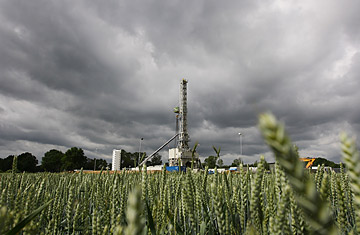
Diving Deep. An early shale-gas well in Poland
The global energy picture used to be simple. There were producers (oil giants like Saudi Arabia and natural gas titans like Russia), and they sold to consumers (industrial nations like the U.S., China and Germany). It was a precarious situation, one that left consumers vulnerable to high prices and producers at risk of low prices, yet no one expected it to change anytime soon.
But it has, thanks largely to an advanced drilling process that sounds like a network-TV curse word: fracking. The technique, which involves the use of explosives, chemicals and millions of gallons of water to create tiny fractures in shale thousands of feet underground, has unlocked new supplies of natural gas long considered too difficult and expensive to tap. In the U.S., where fracking (short for hydraulic fracturing) originated as the product of wildcat drillers and government researchers, it has transformed the industry, revitalizing domestic drilling and producing so much that U.S. natural gas prices recently fell to a 10-year low.
Now Europe and China--which together have more than twice the U.S.'s estimated shale-gas reserves--are following suit, investing billions of dollars in shale-gas drilling. China announced in March it's aiming to produce 6.5 billion cubic meters of shale gas by 2015, and the same month the state-owned China National Petroleum Corp. signed a production-sharing agreement with Shell on shale gas. Europe is moving more slowly, though countries like gas-rich Poland are already drilling. The investments could change the global energy landscape by reducing the world's dependence on Middle Eastern and African resources. "The U.S. has given a major present to international energy with shale gas," Fatih Birol, chief economist of the International Energy Agency (IEA), told TIME in a recent interview. The question now is whether China and Europe can overcome the big environmental, technical and political hurdles holding their efforts back. "We're very much at the early exploration stage for China and Europe," says Neil Beveridge, an energy analyst at research firm Sanford C. Bernstein in Hong Kong. "There's still a large amount of uncertainty around this."
To Frack or Not to Frack
A little more than a decade after energy experts predicted the U.S. would need to import liquefied natural gas (LNG) to offset declining domestic production, American companies are swimming in so much shale gas, they're lobbying Washington to allow LNG exports. But the U.S. isn't the only place with fracking potential; shale gas is proving so abundant, the IEA has predicted that the world could be entering a golden age of gas, in which inexpensive natural gas replaces coal as the electricity source of choice. Energy-hungry Europe and China have two of the richest shale-gas reserves, and China's is potentially the largest in the world.
